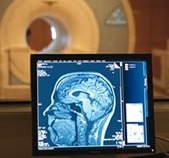I've been volunteering at the Rotman Research Institute as a subject for a variety of investigations into brain health and function. Last year, I participated in two studies addressing memory. The first just involved answering questions, and the second involved electrodes and goo and... messy and fun!
I went in for the a third study this afternoon, this one exploring emotion and memory.Not nearly as messy, but just as interesting. I was slid into an fMRI for about an hour while researcher Daniela Palombo (that's her picture below!) gave me instructions through headphones.
Being in the fMRI was a very relaxing experience - womblike, with an accompanying "musical" soundtrack from the giant 3 Tesla magnets that could be titled "Atonal Concerto for Whale with Truck Horn." I know some people find being in the MRI machine claustrophobic, but the way I look at it, any chance you get to lie down during the afternoon is ok by me. (They even tuck you in with a little blankie!)
A mirror was affixed to the goalie-mask-like head stabilizer (your digital brain movie comes out fuzzy if you move) and enabled me to see a computer screen from my comfy cot. My left hand was fitted out with a heart-rate monitor and a sweat-o-meter; my right was affixed to a button pad on which I could enter either a 1 or a 2 for various responses. I also had a breathing monitor strapped around my middle (it felt like a cuddle from a toddler - not too tight or ickily sticky, though!) and they gave me an emergency squeeze horn if I got panicky. I didn't, but I squeezed the horn anyway just to see if it would sound like Harpo Marx's. It did. Then Daniela got panicky - since she forgot how to turn the darn thing off!
My task was to watch a series of three videos. TV in bed - just like home!
The first included scenes from a generic road trip. My instructions were to try and recall, in as vivid detail as possible, a road trip I'd taken about ten years ago. After the videos, I was supposed to declare how deeply immersed I had become in the memory - did it feel like I was reliving it? Or was it just flat, unemotional, with no bite? I recalled a trip to Virginia I'd taken with my family through the Blue Ridge mountains and Monticello. Pleasant, but not exciting. Not surprisingly, I didn't find my memories particularly vivid or long-lasting; I kept getting distracted by stupid stuff like, "how old is this video anyway? I haven't seen a car like that in years!"
A little break followed, in which I simply had to indicate whether a number flashed on the screen was odd or even. Then I watched a second series of videos.
These showed a traumatic, upsetting scene, one that received a great deal of media attention in the past. I did recall the event shown, and did indeed have a very vivid recollection of where I was at the time and how I had felt. I pressed my right finger several times to indicate an 8 out of 10 on the immersive experience- the videos brought me right back to how I felt at the time.
A second short break with the odds and evens followed, but this time it was actually a bit tricky. My mind kept drifting back to the troubling video, and I had a bit of trouble concentrating, even though the task was ridiculously simple. The power of memory and emotion, eh?
There was one more series of videos to view. These showed another traumatic event, but one of which I had no experience or recollection. I was instructed to imagine how I would have felt if I'd been there, and then describe how intense my experience of it was.
As a writer, with a pretty intense imagination, I was able to conjure up a pretty good false memory, one powerful enough to make my heart pound and tears spring to my eyes as I watched the video. I was suddenly conscious of the huge lump in my throat and how tense my body had become - I guess that's what they mean by "empathy."
The whole test took about an hour, and was essentially painless. I hope that my small contribution, though, will be of great value to the researchers, and help shed light on a problem that afflicts many people around the world. It turns out (Daniela filled me in after I was finished) that the study is looking at how the brain forms memories around traumatic events, and why some people who live through trauma develop Post Traumatic Stress Disorder and others don't. I was a "control" in this study, but some of the other participants had actually lived through the traumatic event I had been shown - and some of those people did indeed wind up developing PTSD.
I'll receive copies of my digital brain videos in about two weeks. I've asked Daniela to explain to me what they show - which areas are reacting most strongly at different points during the test, and what this says about my so-called normal brain. I'll keep you all posted about what the research uncovers about PTSD and the links between memory and emotion.
To see more about the research done at the Rotman Institute, check out their Media and News page. You can take a peek and see what's going on in all of the different labs too! Here are the details on one of the previous studies I volunteered for. And I know I'm kind of an idiot but I love the idea of the ERP Lab - even if their research is really cool and has nothing to do with Erping.
If you'd like to volunteer for a study (you need to live in the Toronto area and be available during the workday), you can contact Daniela Palombo directly. She'll be able to find a study that suits you to a T.
Last but not least, please consider supporting the important research done by the Institute. The Baycrest Foundation funds the Rotman Institute as well as other research on aging and geriatrics.
Please Visit My Website
Friday, March 5, 2010
Subscribe to:
Post Comments (Atom)







No comments:
Post a Comment